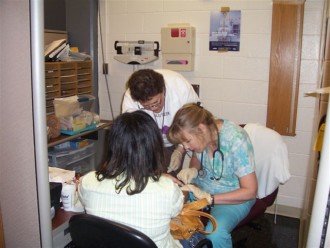Georgia’s charity health clinics produce cost savings when treating patients with hypertension, a new University of Georgia study has found.
Serving patients with high blood pressure in Georgia Charitable Care Network clinics is less expensive than treating them in other settings, including by federally qualified health centers, by Medicaid providers and through private insurance, the study said.
Fueling those savings are doctors who volunteer their time at the clinics for free, and the free medications given to these organizations, said Phaedra Corso, a health policy expert at the University of Georgia’s College of Public Health. Corso led the study, which was funded by Healthcare Georgia Foundation.
There are more than 90 of these charity clinics serving the uninsured across Georgia, the second-highest number among all states after Florida. Most of them are free to patients, but some charge a small fee.
The study also estimated that for every 100 patients that visit a GCCN clinic annually, $50,000 is saved in avoided visits to hospital emergency rooms.
And for every $1 spent by these clinics on patients with hypertension, there is an estimated annual savings of $1.60.
This represents a savings of roughly $24,500 for every 100 patients treated or managed for hypertension in GCCN clinics.
The clinics “are a pretty efficient system,” Corso said.
Hypertension, or high blood pressure, is fairly easy for researchers to track, both before and after visits, she said. “High blood pressure, like all chronic diseases, is prevalent in Georgia.”
Donna Looper, executive director of the Georgia Charitable Care Network, told GHN this week that the study was conducted to pinpoint the savings provided by clinics’ care. “We fill these gaps in care,’’ she said.
Patient demand for clinic care statewide has remained about the same as it was before the full implementation of the Affordable Care Act, which brought more insurance coverage to Georgia.
Demand “has gone down in some areas and gone up in other areas,’’ Looper said. Two clinics have recently closed, in Savannah and in Gwinnett County in eastern metro Atlanta.
About two-thirds of these clinics have a religious affiliation. “They’re really committed to healing the sick,’’ Looper said.
The clinics are funded primarily through individual donations, though the Legislature also gave the clinics $500,000 in the current fiscal year budget.
The patients are predominantly adults from 19 to 64 who have no health insurance, she said.
Many of these people have remained uninsured because Georgia has not expanded its Medicaid program, as outlined under the ACA. The state’s political leadership has rejected expansion, citing the costs involved in the move.
Corso said that in Georgia, “there’s always going to be a place for free clinics.”
The need for them will remain whether or not Georgia later does expand its Medicaid program, she added.
“Even in states that have expanded,” Corso said, “you still see a significant number of uninsured.’’
And if these people can’t get needed treatment, she added, they wind up in the emergency room, the most expensive venue for basic medical care



